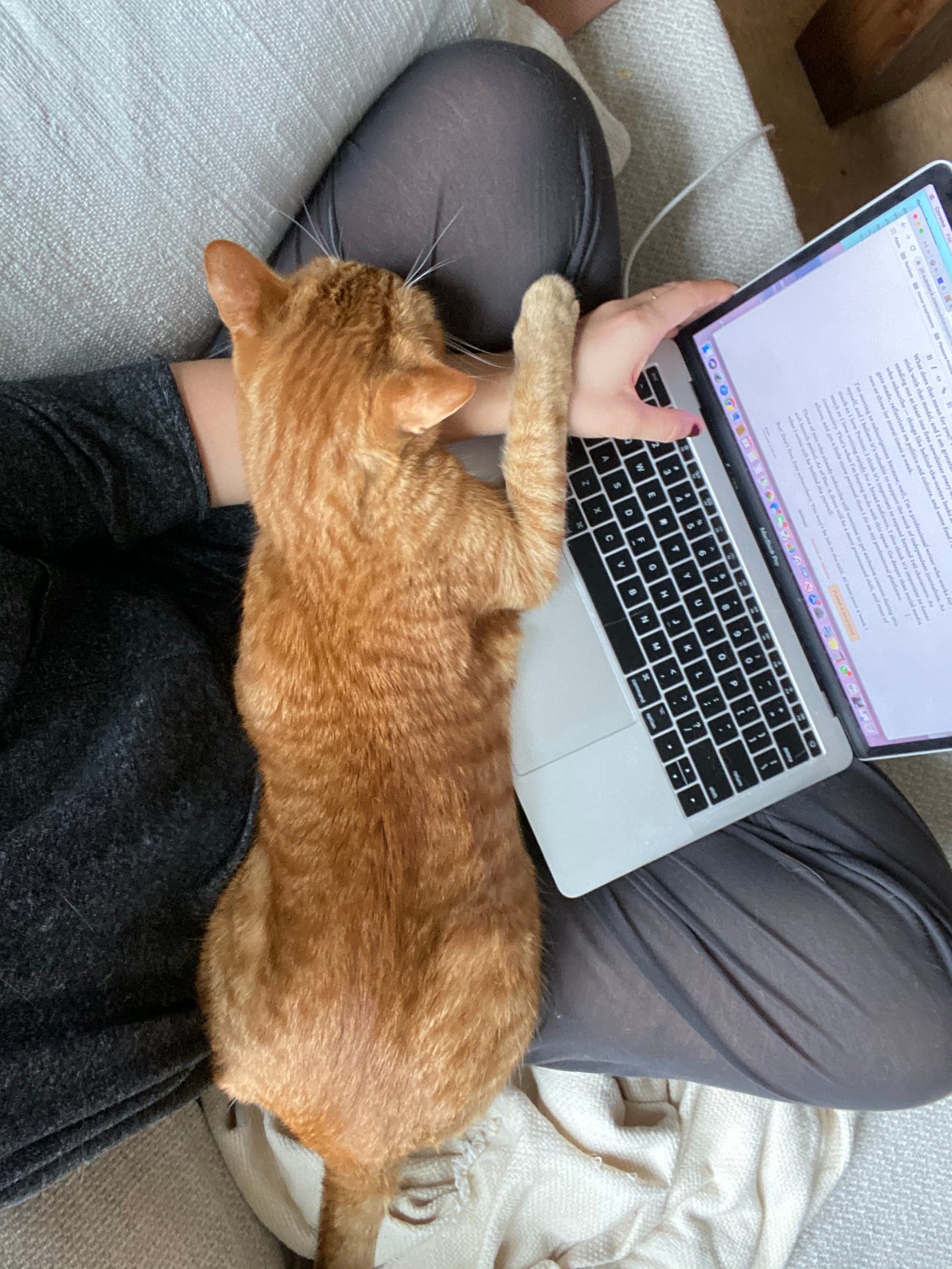
My assistant as I edited this story
How do you write about a troubling dynamic without reinforcing it? I wrote a piece for Medium this week about women who may be discouraged from running for office because at some point in their lives, they took nude or unprofessional photos they worry could come back and haunt them. The publication of intimate photos of former congresswoman Katie Hill, and her resignation, has brought those fears to the surface.
It’s an important topic, and I was happy to write about it and interview several women who all harbored the same anxieties. I feel good about the piece (and I hope you read it and share it). There is strength in numbers, and I’m optimistic that as more young women realize this is a pervasive generational issue, the less it will seem like such a significant hurdle.
And yet, whenever I write a piece like this one, I worry — for the exact reason Amanda Litman, the founder of Run for Something (and a woman I admire tremendously), said in my interview with her:
“You run into a problem where talking about how [nonconsensual pornography] scares women might lead to it scaring women, in the same way that talking about how hard it is for women to run for office might make it harder for women to run for office.”
Indeed. It’s such a fine balance in so much of how we talk and write about gender and inequality. It’s important to talk about work-life balance, for example, but the more we talk about that in female-dominated spaces, the more we send the message that “balance” is a uniquely female problem, and it will always be a barrier for women — something that may, in turn, hold us back. It’s important to talk about the hurdles women face when they run for office, and how the amorphous concept of “likability” handicaps women — but doing so also may reinforce the idea that power-seeking women aren’t likable and aren’t electable, and so it’s just too risky to pick another female presidential candidate.
When you’re a journalist who also really cares about the topics you cover — not just a reporter penning a story, but a human being who is personally invested in the project of women’s rights — this is tremendously fraught ground.
I never want to do harm in the course of my reporting. But there are always ripple effects, and you can’t always predict what they might be.
Most of the women in the piece wanted to be anonymous. But of course they can still see how people respond on social media. Most of the responses to this piece have been positive. But also, it’s Twitter in 2019, and nothing I’ve ever written has gotten a 100% warm and positive reception — especially if it’s about women and sex. I wrote the piece knowing that there would be some ugly, hurtful things said in response to the women I quoted — things that might reinforce their existing fears, that could send the message that it’s too scary and threatening to put yourself out there. I wrote the piece knowing that it’s not just the women I quoted who might see that message — it’s every woman on the internet, watching quietly as the comments and tweets come in.
Obviously I think it’s worth it and necessary to write about this anyway. When I’m deciding whether or not to write a particular story, I do a calculus a lot like the one Adrienne talked about in this piece:
The assessment of when and whether to take such a significant risk is something Adrienne has considered in other aspects of her life. In a recent security training for work in high-risk areas, the facilitator suggested that perhaps the only workable solution to balancing risk with obligation in emergency settings was to conclude that the worst thing would happen — that you could be sexually assaulted or even killed — and build resilience to that eventuality. The question to ask, Adrienne says, is not “what if something bad happens?” but “if the worst-case scenario happens to you, will it have been worth it to go on that trip? And if you can’t say yes, you shouldn’t go.”
“In a weird way it applies to this situation,” she says. “Was it worth it to take those photos if it could ruin your career?” Or, on the flip side, assume the photos will come out. Would it have been worth it to run for office anyway? Is expanding the larger project of women’s rights important enough that you’re willing to take some fire?
If the worst-case scenario happens in response to something I write — if people say awful things about the women who were brave enough to talk to me, if someone reads it and is discouraged — will it still have been worth it?
For this piece, my answer is yes. First, I think there are a whole lot of women out there who think they’re the only one with these fears; knowing there are others, and that we will understand and empathize and fight for you, is the only way this changes. On balance, I think the benefits of that solidarity outweigh the consequences of online trolls and potential hesitation about running. And second, I think I struck the right balance of illustrating a problem and outlining solutions.
The only solution is, as it always is: Some of us are just going to have to be brave.
xx Jill


